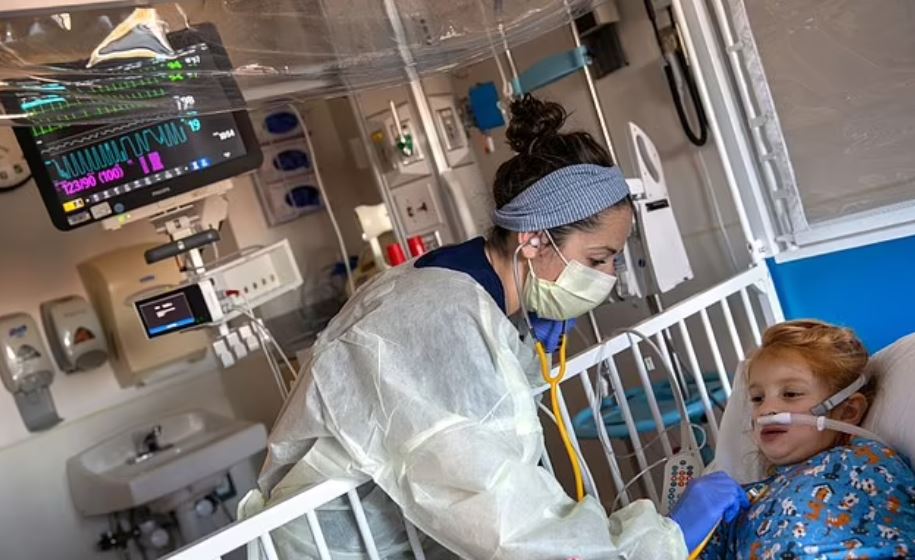
By Nancy Lapid
(Reuters) – The following is a brief roundup of some of the latest scientific studies on the novel coronavirus and efforts to find treatments and vaccines for COVID-19, the illness caused by the virus.
Lung radiation may hasten COVID-19 pneumonia recovery
A low dose of radiation to the lungs of COVID-19 pneumonia patients can help them recover more quickly, a small study suggests. Doctors at Emory University in Atlanta treated 10 such patients with lung radiation and compared them to 10 patients of similar ages who received usual care, without radiation. With radiation, the average time to significant improvement was three days, compared to 12 days in the control group.
Other potential effects included a shorter average time to hospital discharge (12 days with radiation versus 20 days without it) and a lower risk of mechanical ventilation (10% with radiation versus 40% without it). But those two differences were too small to rule out the possibility they were due to chance, the researchers found.
The radiation group was “a little older, a little sicker, and their lungs were a little more damaged … but despite that we saw a strong signal of efficacy,” Emory’s Dr. Mohammad Khan told Reuters.
Khan noted that in the radiation group, COVID-19 medications were withheld before and after the treatment, so the results reflect the effect of the radiation alone.
“Radiotherapy,” Khan said, “can reduce the inflammation in the lungs of COVID-19 patients and reduce the cytokines that are causing the inflammation.” Cytokines are proteins made by the immune system. The results on the first five patients have been accepted for publication by the journal Cancer.
The results on all 10 were posted on Tuesday ahead of peer review on the website medRxiv. The researchers have launched a randomized controlled trial of the treatment and expect to eventually include multiple centers.
Smoking may boost severe COVID-19 risk among young adults
Close to one third of young U.S. adults appear to have an elevated risk for severe COVID-19, with smoking their strongest risk factor, according to survey data.
Researchers looked at data from more than 8,000 participants, ages 18 to 25, in the nationally representative National Health Interview Survey for 2016 to 2018. They also looked at participants’ medical conditions identified by the U.S. Centers for Disease Control and Prevention as making people of any age “medically vulnerable” to severe illness from the coronavirus.
Among these are diabetes, heart disease, immune problems, smoking, poorly controlled HIV or AIDS, and respiratory diseases. Overall, 32% of the young adults surveyed were seen as medically vulnerable to severe COVID-19. Among non-smoking young adults, however, only 16% were seen as medically vulnerable.
“Efforts to reduce smoking and e-cigarette use among young adults would likely reduce their medical vulnerability to severe illness,” the researchers said on Monday in the study published in the Journal of Adolescent Health. “Our analysis suggests that risk from smoking and e-cigarette use is highest among young adults who are male, white, and lower income and who are fully or partially uninsured.”
Coronavirus may rarely pass through placenta
It is unclear whether the coronavirus can pass through the womb from mother to fetus.
On Tuesday, doctors in France reported a very rare case that suggests transmission through the placenta may be possible. In the journal Nature Communications, they described a baby born prematurely to a mother with COVID-19. They found the virus in placental tissue as well as in the mother’s and baby’s blood, which suggests that trans-placental transmission of the novel coronavirus virus may be possible, although further studies are needed. Both mother and baby recovered well.
Marian Knight, a professor of maternal and child population health at Oxford University, said the case should not be a major worry for pregnant women. Among the many thousands of babies born to mothers infected with the virus, only around 1% to 2% have been reported to also have had a positive test, Knight said.
Promising results from early trial of new vaccine
Moderna Inc’s experimental vaccine for COVID-19, mRNA-1273, was safe and provoked immune responses in all 45 healthy volunteers in a first-in-humans phase 1 study, researchers reported on Tuesday in the New England Journal of Medicine. Volunteers who got two doses of the vaccine had levels of virus-killing antibodies that exceeded the average levels seen in recovered COVID-19 patients.
Dr. Anthony Fauci, director of the U.S. National Institute of Allergy and Infectious Diseases, whose researchers developed Moderna’s vaccine candidate, called the results good news. Fauci noted that the study found no serious adverse events and the vaccine produced “reasonably high” levels of virus-killing or neutralizing antibodies.
“If your vaccine can induce a response comparable with natural infection, that’s a winner,” Fauci told Reuters. “That’s why we’re very pleased by the results.” A phase 2 trial testing the vaccine’s efficacy in a larger group started in May.
A much larger phase 3 trial to confirm efficacy and identify rare side effects will begin this month, ultimately including 30,000 participants. Separately, early-stage human trial data on a vaccine being developed by AstraZeneca and Oxford University will be published on July 20, the Lancet medical journal said on Wednesday.
(Reporting by Nancy Lapid, Kate Kelland and Julie Steenhuysen; Editing by Will Dunham)




 Britain’s chief medical officer is warning that the world could find itself “in a health system not dissimilar to the early 19th century at some point” as more bacteria become resistant to antibiotics.
Britain’s chief medical officer is warning that the world could find itself “in a health system not dissimilar to the early 19th century at some point” as more bacteria become resistant to antibiotics.

